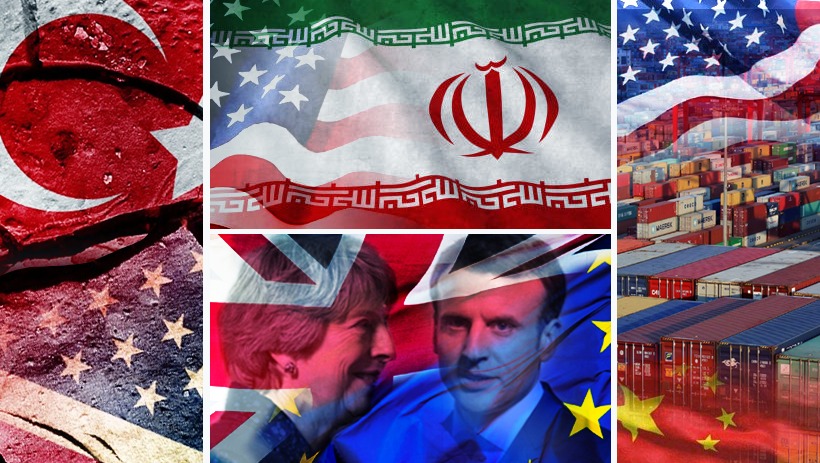US-Turkey: the conflict escalates
On the 1st of August the U.S. government imposed sanctions against Turkish Justice Minister Abdulhamit Gul and Interior Minister Suleyman Soylu over the imprisonment of Andrew Brunson. The United States has blamed both for being involved in Brunson’s arrest and detention. The Pastor was accused by the Turkish government of being connected with Gulenist groups and is seen as a participant of the Gulenist coup d’état in 2016. Erdogan declared that he will impose sanctions symmetrically on two US officials. The escalation of the conflict happened against the background of the massive crisis in relations between US and Turkey, which started during the Gulenist coup d’état in 2016. During the last BRICS summit, Erdogan declared that he was interested in entering into the BRICS formation. The Turkish government has been reorienting itself towards an antiglobalist political agenda and has begun to develop a multipolar vision of the world. Read the forecast about the US-Turkey relations in our analytical research.

Brexit talks: The Macron-May meeting
French President Emmanuel Macron and British Prime Minister Theresa May held a meeting in the French fortress Bregranson on the 3d of August. The key theme of discussion was the Brexit problem and the future conditions of UK collaboration with the EU. The UK is entering a deep political crisis: May is no longer seen as legitimate for the soft-Brexiters, nor for the hard-Brexit (Johnson and Davis resigned several weeks ago as a protest to the indecisive and soft proceedings May enacted to vacillate the UK leaving the EU). According to the latest YouGov poll, Theresa’s May popularity has fallen to an all-time low: only 25 % of respondents have a favourable view of Mrs May, and 62% doesn’t like her political agenda). The Independent launched a campaign for the new Brexit referendum, according to this globalist publication, it’s important for the UK to remain in economic partnership with the EU. The petition is supported by Minister of Education Justin Greening, ex-Prime-Minister Tony Blair and the leader of the Lib. Dem. party Vince Cable.
The US-China trade war
Proposals to increase the trade duties on goods imported from China to the US were approved by President Donald Trump, US Commerce Secretary Wilbur Ross reported on August 2. Ross said that the idea of raising state duties on the import of goods from China is being carried out with the aim of putting political and economic pressure on China’s foreign policy. U.S. Trade Representative Robert Lighthizer has also discussed the possibility of raising of tariffs from 10 percent to 25 percent on $200 billion in Chinese goods, ranging from cellphones and televisions to toys and clothes. If the plan is accepted, the tariffs will go into place this October.
In response, China has announced a counter-sanctions package for trade threats from the US. Beijing plans to introduce duties with differentiated rates for goods from the US worth up to $ 60 billion a year.
Sanctions against Iran: The U.S. strikes again
On the 6th of August, Washington will partially restore sanctions against Tehran. The sanctions will affect the automotive sector, as well as trade in gold and other metals. Sanctions against Iran were suspended after the nuclear agreement of 2015 between Tehran and six international mediators. The parties agreed that sanctions would be restored only on the condition that Iran fails to not fulfill its agreed-to obligations. Nonetheless, this spring, the US withdrew from the controversial deal due to domestic pressure. Two weeks ago, Iran filed a complaint against the United States in the International Court of Justice because of “unlawful reintroduction of sanctions unilaterally”.

















Leave a Reply